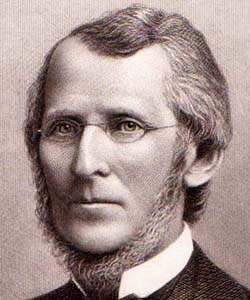Daniel Moore Bates (Dickinson Chronicles)
Scholarship
Daniel Moore Bates was born in Laurel, Delaware on January 28, 1821 as Daniel Elzey Moore, the son of Methodist minister Jacob Moore. He had lost his mother very early in life and as a young boy traveled with his father on his circuit. When his father died in 1829 he was still only eight and he was taken in by local lawyer Martin Waltham Bates and his wife, Mary Hillyard Bates. They became his well loved family and he adopted their name legally, becoming Daniel Moore Bates. In later life he would care for his ailing father until his death in 1869. The Bates were influential and wealthy, and thanks to their efforts, Daniel was able to enter Dickinson College in Carlisle, Pennsylvania at the age of fourteen and graduate with the class of 1839.
Bates returned to Dover and studied law under his father and was admitted to the bar there in 1842. He joined his father's law firm. One of his first forays into civic affairs came in May 1843 when he became a founding member and officer of the State Colonization Society of Delaware, set up to join with other societies encouraging repatriation of former slaves and other African Americans to Africa. Bates' career developed quickly and the Democratic Governor, William Tharp, appointed him as Secretary of State for Delaware in January 1847; he served until 1851 and the end of Tharp's term. One of his successes in that office was to sit with the state chancellor and the sitting chief justice on a commission that revised and codified all state laws. In 1852, President Pierce appointed him as U.S. district attorney for Delaware and he worked in this post until 1861. He was one of the five Delaware commissioners dispatched from Delaware to the Peace Conference in February 1861 seeking to avoid the breakup of the Union and was one of the committee of nine that prepared the plan to appease the slave states. Following the war, he was named as the unanimous choice to fill the post of chancellor of the state and served in that post till 1873 when he was succeeded by fellow Dickinson alumnus Willard Saulsbury. During his professional life, he also built up a record of philanthropy and civic service, acting as founding member for organizations as diverse as the Home for Friendless and Destitute Children in 1863, the Wilmington City Railway Company in March 1864, and the Historical Society of Delaware in May 1864. In 1869, Dickinson College awarded him an honorary doctorate. Bates had already served his old college on its board of trustees between 1848 and 1865.
Bates married Margaret Handy of Snow Hill, Maryland on November 7, 1844 and the couple had four children with another dying in infancy. Margaret Handy died in October 1869. He had resigned his state office on doctor's advice and was urged to travel for his health. This he did with his family in Europe and returned in 1875, refreshed enough to begin writing and take up partial practice again in 1877. In March 1879, he was traveling to a case in Richmond when he fell ill and, after a two week illness, Daniel Moore Bates died on March 28, 1879. He was fifty-eight years old.
Bates returned to Dover and studied law under his father and was admitted to the bar there in 1842. He joined his father's law firm. One of his first forays into civic affairs came in May 1843 when he became a founding member and officer of the State Colonization Society of Delaware, set up to join with other societies encouraging repatriation of former slaves and other African Americans to Africa. Bates' career developed quickly and the Democratic Governor, William Tharp, appointed him as Secretary of State for Delaware in January 1847; he served until 1851 and the end of Tharp's term. One of his successes in that office was to sit with the state chancellor and the sitting chief justice on a commission that revised and codified all state laws. In 1852, President Pierce appointed him as U.S. district attorney for Delaware and he worked in this post until 1861. He was one of the five Delaware commissioners dispatched from Delaware to the Peace Conference in February 1861 seeking to avoid the breakup of the Union and was one of the committee of nine that prepared the plan to appease the slave states. Following the war, he was named as the unanimous choice to fill the post of chancellor of the state and served in that post till 1873 when he was succeeded by fellow Dickinson alumnus Willard Saulsbury. During his professional life, he also built up a record of philanthropy and civic service, acting as founding member for organizations as diverse as the Home for Friendless and Destitute Children in 1863, the Wilmington City Railway Company in March 1864, and the Historical Society of Delaware in May 1864. In 1869, Dickinson College awarded him an honorary doctorate. Bates had already served his old college on its board of trustees between 1848 and 1865.
Bates married Margaret Handy of Snow Hill, Maryland on November 7, 1844 and the couple had four children with another dying in infancy. Margaret Handy died in October 1869. He had resigned his state office on doctor's advice and was urged to travel for his health. This he did with his family in Europe and returned in 1875, refreshed enough to begin writing and take up partial practice again in 1877. In March 1879, he was traveling to a case in Richmond when he fell ill and, after a two week illness, Daniel Moore Bates died on March 28, 1879. He was fifty-eight years old.
John Osborne and James W. Gerencser, eds., “Samuel Stehman Haldeman,” Dickinson Chronicles, http://chronicles.dickinson.edu/encyclo/b/ed_batesDM.htm.


